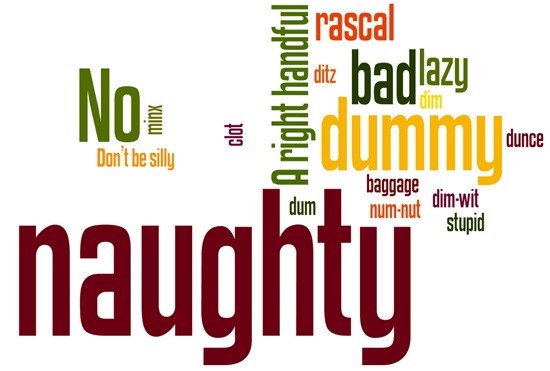Words can hurt
We like words. Chris studied linguistics. I studied languages. We’ve both spent considerable periods as editors. We read. A lot. We’re also very interested in how children learn language and build vocabulary. And how the meanings of words can change over time. And how the words people use to talk to you and about you can affect you. So we can get a bit het up about the words people use around children – especially ours.
The word ‘naughty’ was pretty much banned from the house, though it has gradually crept back in as Rosemary has grown – probably wrongly. Far too often, it seems, ‘naughty’ is used to describe the behaviour of babies and toddlers, when the concept of naughtiness is beyond their comprehension. A baby who cries a lot is described as ‘naughty’ or ‘bad’. A baby who is quiet and calm is described as ‘good’. My mum will probably remember me reminding her frequently not to say ‘She’s been really good today,’ when handing back a baby or young toddler. What you mean is ‘She’s been quiet,’ or ‘She’s been very happy, today.’ And I would never let a ‘She’s been so naughty!’ go without questioning.
As children get older, of course, they do develop the ability to be naughty but, for a while even, there remain underlying developmental reasons. Boundary challenging is an extremely important part of growing up and learning, for example. It might be bloody hard work for the adult dealing with it, but it’s still essential. That doesn’t mean we should allow them to get away with breaking all the rules, but that we should make it clear to them what the rules are and that they need to keep within them. Rather than saying ‘Don’t be naughty,’ try saying ‘We don’t do that,’ or ‘That’s not acceptable.’ Or be more specific – ‘Kicking is wrong. It hurts when you kick me.’ ‘Don’t throw all the pens on the floor. Please pick them up, now.’
I really, really hate the word ‘naughty’ and it upsets me to hear Rosemary using it. She’s used it to describe some of her classmates and it worries me that their teachers or parents are using the word and they are being labelled as the ‘naughty child’. I’ve recently started hearing her use it to describe Eleanor’s behaviour, or to Eleanor, and I have explained to her how she’s not really being naughty, but she’s exploring her world and testing out the rules. I’ve told her it’s better to say ‘Don’t do that, Eleanor. It’s not nice to…’ And she’s quite good at taking it on board, but still slips now and then. (Though there are a whole bunch of issues with the word ‘nice’, too, which I won’t go into right now.)
There are many similar words which I dislike being used with children – dummy, silly (but I’m quite happy to say ‘Silly Mummy’ for some reason), stupid, rascal, minx – though it’s not completely unusual for me to have to kick myself when I find myself using one of them. Rosemary has expressed a dislike, herself, of being called ‘weird’ and I try to make sure I don’t use that, but have sometimes lapsed.
I’m sure there are plenty of people who think this is all being over-the-top (and probably veering towards the stuck-up middle-class pushy parent). And there are others who will go a lot further – for example, I know people who avoid the word ‘No’ for a long time and I can definitely see the reasoning behind this, but just can’t seem to stop myself from uttering it a few hundred times a day.
There are also words and phrases that have gender-stereotyping connotations and that I try to avoid or cringe when I hear them – tom boy, boisterous, ladylike, for example.
Do you think words matter for children? Are there words or phrases you avoid using on or with your children? Do you worry about them picking them up at school and with friends? Do you think it doesn’t matter?


Leave a Reply